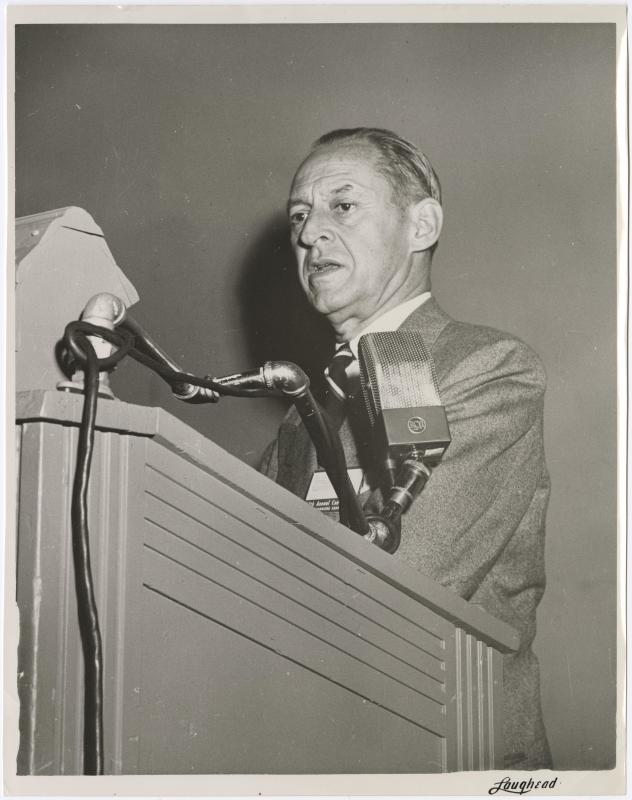Eccles in the Post-Fed Years
by Kenneth Rockwell | Metadata Librarian, J. Willard Marriott Library, University of Utah
After his departure from Washington, Marriner Eccles resumed business activity, and continued to give public speeches. He got many invitations but could only accept some of them and had to decline others due to a busy schedule. In his speeches, Mr. Eccles often discussed contemporary issues in light of their economic aspects, causes, and consequences. Topics included foreign relations during the Cold War; overpopulation; and America’s involvement in the war in Vietnam.
In a speech delivered before the National Association of University Presidents in Salt Lake City on 3 May 1954, Eccles touched on foreign relations and suggested the need to have relations with Communist China:
"Nothing is solved by our denial of the fact that the Communist government is the government of China. In fact our attitude toward China only serves to weld the communist world more closely together. Realism instead of political expediency is sorely needed. … We must recognize sooner or later that economic necessity is more powerful than any other force in ultimately determining the course of history."
Nearly twenty years later, numerous correspondents would congratulate Mr. Eccles for a vision that that seemed so prescient in light of President Nixon’s visit to China in 1972.
Marriner Eccles recognized the economic dimensions of overpopulation and monetarily supported the Planned Parenthood Foundation. In a speech at a testimonial dinner marking the opening of the International Conference of the World Population Crisis in New York City on 11 May 1961, he drew connections between overpopulation, poverty, and the Cold War struggle between capitalism and communism, and declared:
"Any foreign aid program is, at best, a stopgap unless we deal with the basic cause – which is the runaway population. Unimpeded fertility is giving the backward countries exactly what they do not need – more people – and hindering what they do need – more capital, more skills and greater productivity.
"To the business community … I say: It should, in its own enlightened self-interest, strongly support this cause both morally and financially. The prevailing notion that surging populations guarantee increasing profits is a fallacy. On the contrary, such populations perpetuate poverty and therefore fall easy victims to the glittering but never fulfilled promises of communism, this in turn destroys democracy and with it capitalism. Capitalism wherever it may be cannot expect to survive as an island of abundance in a sea of poverty."
As controversy over the Vietnam War heated up in the United States, Marriner Eccles took an early stand against escalating our involvement. In a statement released on 22 December 1965, Eccles wrote:
"If the war is escalated, before many months the United States will probably be required to go on a war footing and our present domestic prosperity will be ended. Inflationary pressures will greatly increase and the position of the dollar in the world market will be further jeopardized unless we bring about a balanced budget through increasing taxes and cutting domestic programs. … The billions being wasted on the war in Vietnam, if used to eliminate mass poverty and illiteracy in the undeveloped countries, would do far more than aggression to prevent the spread of communism.”
While Mr. Eccles was long associated with a Democratic White House (1934 to 1951), he was not particularly partisan, and supported candidates over the years that he thought would better address the issues of the day. He ran for the U.S. Senate as a Republican in 1952, but did not get the nomination. He supported Lyndon Johnson in 1964, but after the President’s escalation of the Vietnam War, he contributed to various congressional and presidential candidates in both parties who supported withdrawal. As he explained in a letter dated 1 February 1968 to Charles Porter of the anti-Johnson “National Committee of Independent Democrats:
"I am not interested in being identified with or contributing to any organization, Republican or Democratic, for the purpose of electing anyone. I am neither a Democrat nor a Republican; I have always been an Independent. I am personally substantially contributing and helping every way I can five Democratic Senators whom I know personally, who have taken a strong anti-Vietnam position, and who are coming up for re-election this year. I cannot cover any more bases at this time.
"So far as the Presidency is concerned… I am not going to support any candidate until he is nominated. If Nixon and Johnson should be the nominees, I will save money, as I will not support either one of them."

